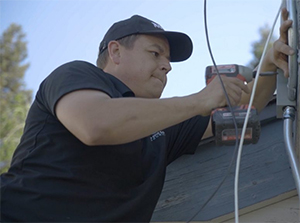Tips on Finding and Hiring the Right Low Voltage Contractor
Posted By Remote Techs On 09-October-2021

You’ve got a commercial construction project that requires the services of a low voltage contractor. Whether it is a reorganization of an existing structured cabling system to accommodate growth, a simple network cabling installation, or a large project that includes the above and a whole shooting match of Video Security, Alarm, Access Control and Audio Visual services, you want to make sure you are hiring the best Low Voltage Contractor for the job. Taking the time to research and vet out potential subcontractors is well worth the effort and helps assure a successful finished product.
There are several best practices to utilize when searching for and eventually hiring the right Low Voltage Contractor for your project. Here’s a list to consider:
Where to find Low Voltage Contractors
Trade Association Membership – Start here. There are national and local Low Voltage Trade Associations and they are happy to share their membership list. Members will be licensed which also means properly educated, trained and experienced.
Electrical Union Local – If your project requires union tradesmen, a call to the local union may get you a list of low voltage electrical contractors that are signatory to the union agreement in the locale of the project.
Web presence – Face it, you’re going to resort to Google for the above and beyond. Not all good contractors belong to an association or are union, so do a google search as a second pass. Try searching for “Low Voltage Wiring Contractors” or narrow it down to a specialty such as “Audio Visual Technician”, “Low Voltage Cabling” or real specific “Alarm Systems” etc. You get the idea. Get a feel for the overall company by checking out their web site and looking for clues as to their experience. You can usually spot “trunk slammers” (tradesmen who work out of their car with little or no web presence nor office) by an outdated or non-existent web site. When in doubt, google map their street address and if it is a residence, keep looking elsewhere unless you want to take a chance with a probable low ball quote. NOTE: Google has a LOT of outdated/bad data so you will learn to spot and ignore what doesn’t exist. Clues to look for on a Low Voltage Subcontractor’s website:
- Types of systems they install
- Geographic location and reach
- Industries for which they have performed work (ie: retail, industrial, government, etc.)
- Lists or logos of companies they have performed work for
- Lists of projects they have completed
- Case studies of projects that have been involved with, ideally with descriptions of innovative solutions to difficult situations
- Check out reviews and read what people have said about them. If the reviews aren’t on their website, look for links to accounts on Facebook, LinkedIn, Instagram, etc. Posts and reviews on these sites also help provide a “feel” for the company
Business Directory – Like the old fashioned Yellow Pages, there are online directories such as Yelp.com that can be searched for businesses of all sorts. Yelp also provides a crowd-source review forum but there is some controversy for the accuracy/validity of Yelp reviews.
Word of mouth – or existing contract. Ask others whose opinion you respect, or, if your project is in an existing facility, ask the building owner or property manager if they have a preferred low voltage electrical contractor for network cabling services and if they are open to others.
Getting a Quote from a Low Voltage Contractor
Once you’ve compiled a list of potential contractors, the fun begins. You want them to quote your project and your aim is to hire the right one at the best value. This does NOT necessarily mean low bid. Reach out to the companies on your list via your preferred method: email from their website or give them a call (my preferred, if the list is short… ask for an estimator).
There is also Invitation to Bid software out there that major electrical and general contractors use, but that is another subject.
Make sure you have information handy that they will need in order to give you a comprehensive quote. Details may include:
- Brief description of the overall project and a summary of what the low voltage scope of work involves
- How they can access the plans and specifications for the project (if any)
- The date and time they are required to get you a quote
- An approximate schedule of when the project construction is beginning and approximate schedule of when their work is required to be started and complete. Really big projects may have their work happening a year or more out from date of bid. They need to know this.
- Any site visit date/times for an existing facility that they need to attend